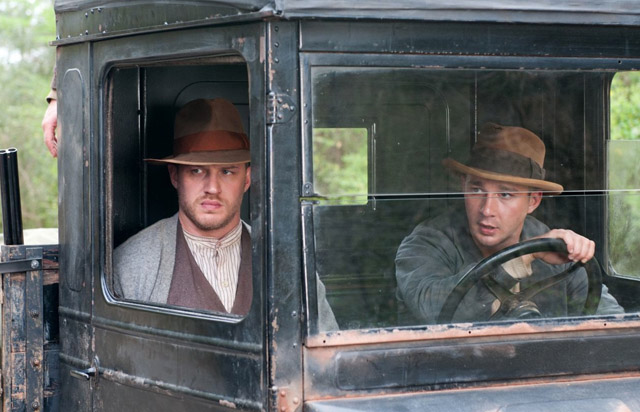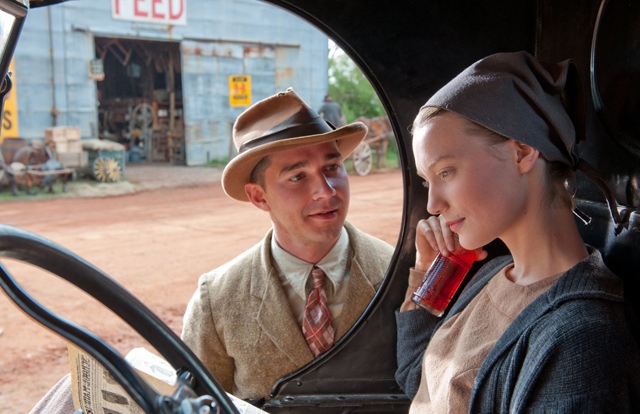CHICAGO – In anticipation of the scariest week of the year, HollywoodChicago.com launches its 2024 Movie Gifts series, which will suggest DVDs and collections for holiday giving.
Interview: Novelist Matt Bondurant on ‘Lawless’ Book-to-Film Adaptation
CHICAGO – Ernest Hemingway said the best way to handle Hollywood film adaptations is to meet at the border, throw your book in, have Hollywood throw the money back, and then run from each other in opposite directions. How does that astute observation apply today? Matt Bondurant had his novel adapted into the new film “Lawless.”
Bondurant wrote his book, “The Wettest County in the World,” in 2008 – based on the exploits of his moonshine producing relatives in 1930s Franklin County, Virginia – and immediately got attention from the film industry to adapt it. Shooting was to begin in February of 2010, but the project had delays due to story and cast issues. Eventually filming began in March of 2011, but a distribution switch delayed the final version, which had been re-titled “Lawless” in 2012. The film is being released on August 29th.
 Photo credit: Richard Foreman for The Weinstein Company |
HollywoodChicago.com sat down with author Matt Bondurant to have him explain his adventures in Hollywood, and how the story of his own next of kin are now being portrayed through name actors like Tom Hardy and Shia LaBeouf.
HollywoodChicago.com: There was a delay from the initial interest in the story to finally getting it to the screen. What did you learn about the movie business in the process of the adaptation?
Matt Bondurant: One the things that is unsettling about it, is that everyone that I was in touch with or who was talking about it, was just so relentlessly positive and optimistic. They all are telling you that it’s awesome, brilliant and was going to work, and I knew that they are telling me that in part to keep me happy. So it’s a facade thing. I just wanted more honesty, less pretending. But I have good agents that are doing their best to talk to me straight, as much as they professionally can. It’s not a slight against them, but the whole system is that way, that’s kind of weird.
On the other hand, once the production got rolling, when I visited the set and talked with and actors and director John Hillcoat, what I learned was there is a general enthusiasm and integrity at the core creative level. The passion for the project was really impressive, exciting and humbling.
HollywoodChicago.com: How closely did you want to be personally involved, and were you satisfied that you got a voice in the process?
Bondurant: I think I got the amount of voice I wanted, which was really none. [laughs] Going in I didn’t really want any control, nor did I assume I would get any. When I realized that Hillcoat and the other people were attached early on, I thought yes, you take that, and do it. I liked and respected their work, so please just do what you do. And I got a good feeling because I wasn’t ignored, they were generous in reaching out to me, even though they didn’t have to. That’s what I mean when I say I had the perfect amount of interaction. I felt involved, but I had no real responsibility.
HollywoodChicago.com: Now how did rocker Nick Cave become the screenwriter for the novel’s adaptation?
Bondurant: I think he and Hillcoat are part of a team, they did ‘The Proposition’ [2005] together. I don’t know if they’ll partner up every time, but on this film they were together again. Cave is a veteran writer of screenplays and novels, and his reputation back in the day as a rock star was mostly about lyrics, so he is a writer of note.
HollywoodChicago.com: Were you able to give Shia LaBeouf or any of the other actors tips to how men like your relatives would carry themselves during that era, or were they making the interpretations on their own?
Bondurant: Not specifically Shia or Tom Hardy, but Jason Clarke, who played Howard – we did have lengthy phone conversations. He actually went down to Franklin County to stay with my cousins for three days. He wanted to get the accent right, and he was driving through, so he hung out with my aunts, uncles and cousins – they even sent me pictures. He comes from a rural area in Australia, and he understands the lifestyle anyway, and he’s just a really nice guy.
HollywoodChicago.com: What did you find out in your research about the quality of a man in your grandfather’s era? Were they better men than the type of men we are now, or was it just different circumstances?
Bondurant: I don’t think particularly that they were better men than we are now. I think circumstances have a lot to do with it. There is a physical quality, to some degree, that has to do with a physical stamina and subsistence living, that we would have difficulty with now. But at the same time, we deal with complex things and complex issues, in a way opposite to their more simple world. For example, we multi-task far more today, that would be astonishing to them.
 Photo credit: Richard Foreman for The Weinstein Company |
HollywoodChicago.com: Were the personalities we saw on screen in “Lawless” the approximate personalities of your relatives, or was the truth more subtle? What did you invent about them in writing the novel?
Bondurant: Approximate is a good way to put it, as far as the personalities on screen. The novel provides much more backstory, in the complex nature of the characters. For example, giving more of a reason than the movie as to how they came to be this way. The character of Howard doesn’t get much screen time or backstory, except for Jack mentioning that he was in ‘The Great War’ [WWI]. He is the older brother, and the most unpredictable, but the book provides more nuance. I did invent personality traits in the novel. I did know my grandfather Jack, but only as an old man. There were things I knew about his brother Forrest that helped me to create the character, like anecdotes and old court transcripts.
HollywoodChicago.com: Also given your research, were people during the Depression able to survive better despite a 25% unemployment? Or was the survival instincts and basic cruelty depicted in the film closer to reality in your estimation?
Bondurant: What is unusual about Franklin County is that the Prohibition era allowed them to make more money, but also introduced a more violent aspect. I saw it more as a continuum, they were poor before the Depression, they were poor during it and they were poor afterward. There was a spike with moonshining during Prohibition, but things were basically the same. There were subsistence farmers there, they had tobacco, so they could maintain.
What did hit them hard in December of 1930 was a huge drought. That’s how I got those three brothers to a bridge, with a truck full of moonshine, confronting sheriffs who wanted to kill them. The drought was so bad that everyone lost what little they had on the land, and with that gone they had to up the production of moonshine. You have to produce more and transport, just to make money.
HollywoodChicago.com: Basically bootlegging came out of Prohibition, and much of our “drug war” is based on the same type of prohibition. What comparisons or differences do you see in the operation of your grandfathers and uncles, and the type of folks dealing in the drug trade now?
Bondurant: Actually Hillcoat and Cave started talking about that, before that I hadn’t even thought about that correlation. It’s an apt comparison, certainly. I think though with moonshine, you’re talking about a tradition that goes back for centuries. It becomes a cultural touchstone for Franklin County and other parts of the United States, particularly the Appalachians. That carries with it a whole series of attendant rituals, traditions and attitudes. I don’t think you could say the same thing about meth, which is purely about making money.
HollywoodChicago.com: Why do you think that era of organized crime was so romanticized, despite the killings, thuggery and greed? Do we as a society always desire or romanticize something we don’t know or understand, if it’s outside the law?
Photo credit: Patrick McDonald for HollywoodChicago.com |
Bondurant: Yes, there is a fair amount of romanticizing. The reasons why I think the romanticizing of Prohibition works this way is that there is a mutual agreement that it’s a bad idea. People who are involved in breaking the law back then, it was breaking the law that was a bad law. It does soften things, and those who struggle against such a law could be viewed as doing the right thing.
The violence is unforgivable, but in a ‘lawless’ time, people were openly flaunting an opposition to federal laws. It was actually popular, people swarmed into speakeasies. And law enforcement itself often looked the other way, which was another factor.
HollywoodChicago.com: One of the occupational hazards of being a fiction writer is the isolation necessary to formulate a short story or novel. How do you deal with the isolation, what are the ways you relish it, rather than letting it overwhelm you?
Bondurant: I crave the isolation. I’m actually looking for opportunities to be as isolated as possible because I have a wife and two small children. So if I can get time to myself it’s a remarkable thing. From a very young age, because I read a lot, I spent a lot of time with my own thoughts. That carried over when I got older, because I spent a lot of time traveling by myself. That being said, whenever I spend time at a writer’s colony, I get a bit itchy after a couple days in the cabin. I do like to talk to people, but the perfect day for me is to write all day, go out to dinner and have some conversations over a few drinks, then go home. Sitting in a chair, staring at the screen, it can be daunting.
HollywoodChicago.com: What will you change next time if another one of your books are optioned for the movies? What kind of interaction do you feel will best represent your work?
Bondurant: I really would like to do it the same way I described earlier. [laughs] If I’m so fortunate to have this thing happen again, and if I’m fortunate to have this amazing creative people involved in the project, I will happily do the same thing again.
 | By PATRICK McDONALD |


